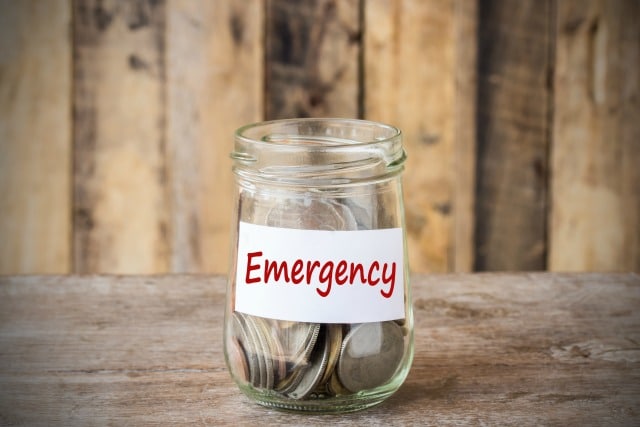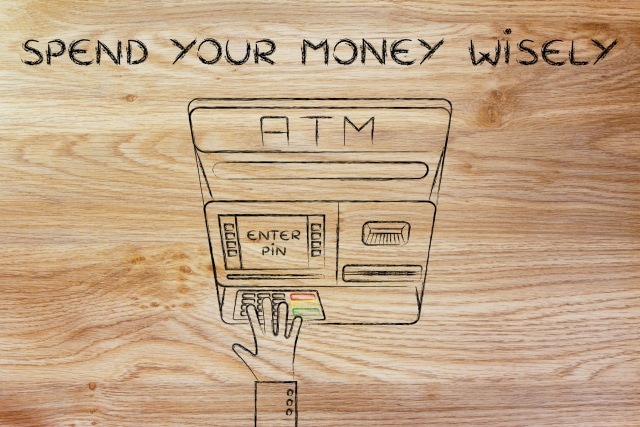Emergency Fund Benefits and How We’ve Saved For Ours
This website may earn commissions from purchases made through links in this post.
Benefits of having an emergency fund practical tips for saving one. We share personal experiences about building an emergency fund.

“If we fail to anticipate the unforeseen or expect the unexpected in a universe of infinite possibilities, we may find ourselves at the mercy of anyone or anything…” Fox Mulder, The X-Files (movie) 1998.
Sci-fi fan or not, Mulder has a point, and building an emergency fund is one way of anticipating and preparing for the unforeseen and unexpected.
I don’t deal well with stress. I have a low tolerance for all things cortisol-inducing. And so I find an emergency fund helps stave off 3 am insomnia.
An emergency fund is money put aside specifically for emergencies, such as losing your job, unexpected repairs on the house or car, or illness. It’s a rainy day fund for when (not if) things go wrong.
Because something is always bound to go wrong at some point.
An emergency fund is savings on top of our regular savings that we only dip into when pre-defined emergencies occur.
Disclaimer: This is general information only. In this blog, I share my savings and budget planning and what works for us. You should always consult a qualified financial expert when making money decisions to tailor plans to suit your circumstances.
Why Build an Emergency Fund?
Emergencies can happen at any time, whether we can afford them or not. An emergency fund provides a buffer against financial stress and worry when things go wrong.
While traditionally, an emergency fund is a buffer against unemployment, there are all sorts of emergencies that can come up: accidents, illness, necessary repairs around the house, to the car, emergency travel interstate or overseas if you live away from your family.
While my husband may disagree (he thinks I worry too much), planning for the unexpected gives us peace of mind. I remind him that he doesn’t have to worry because when stuff happens (and it does), I’ve already prepared us. (Yes, I can be as annoying as that last sentence sounded).
The thought of being retrenched is stressful, but knowing you have a savings buffer to cover you for a few months of unemployment (knowing you can still pay the rent and feed the family) takes at least a little of the stress out of it.
Building an emergency fund also helps prevent debt, interest, and late fees.
If the hot water heater suddenly breaks and we have to go out and buy a new one, then our emergency fund prevents us from going into debt to fund it. No debt equals no interest to pay, which means we’re not paying more for the item than we need to.
Where Do We Save Our Emergency Fund?
We want our emergency fund to be as liquid as possible, so keeping it in a savings account, from which we can withdraw at any time, is the easiest option.
The American celebrity personal financial advisor Dave Ramsay recently stated that it’s not important how much interest you earn as your emergency fund is not intended as an investment.
I don’t necessarily agree. Why not be smart about our money and earn as much interest as possible? I use an online high-interest account that has no fees and no withdrawal penalties. My fund is liquid but still earning good interest (well, as good as it gets these days).
A savings account is the easiest option, especially when we were starting out. Of course, you should speak to a qualified financial advisor to see what options are best for your circumstances.
How To Start an Emergency Fund
It’s hard to build an emergency fund when money is already stretched thin and there are current bills to pay, let alone worrying about what might happen in the future.
Here’s what helped us get started.
Spending less than we earn.
The mantra of personal finance that is getting hard these days with the rising cost of living, but is still the only way to build savings (unless you rob a bank, which I don’t recommend). We use a budget to help us save.
We started small.
Thinking that we have to save thousands of dollars was too demotivating. It was a huge goal that seemed impossible.
However, having a smaller goal, like putting aside five dollars each payday, felt realistic and manageable. Five dollars doesn’t seem like much, but time passes anyway. We didn’t miss that five dollars, and it eventually added up.
We automate as much as we can.
Automation is key to our savings plan. Having our savings funds whisked away each payday without any effort on my part means saving money happens whether I can be bothered or not.
And we don’t miss what we don’t see.
We think of it as a bill.
We have to pay our bills on time, I figure I owe it to us to pay us on time. After all, we’re the ones working for the money. So we pay ourselves first to ensure we save.
We use tax refunds and bonuses.
If we’re ever lucky enough to get a refund or bonus, we use most or all of it to boost one of our savings goals, including our emergency fund. It doesn’t happen often, but it’s a nice little boost when it does.
We’ve sold clutter to build our fund
Everyone collects clutter along the way. We’ve sold items we no longer need to help boost our emergency fund.
It’s a win-win – someone gets stuff they need for a fraction of the cost of new, we get some money back, and stuff is kept out of landfill.
How Much Should an Emergency Fund Be?
Some experts suggest saving as little as $1,000, others up to three-six months of income.
Obviously, it’s going to be different for everyone as everyone’s circumstances are different.
When we were starting out, six months of income in an emergency fund was an impossible goal. So as I said, we didn’t think about big amounts; we focused on what we could save each week.
How I calculated our emergency fund
For me, it makes more sense to work out how much emergency fund we need based on expenses rather than income.
Expenses usually grow to meet income, and if we need, I can cut back on a fair few expenses to stretch our savings.
Step 1
The first step I took was to look at our minimum monthly expenses. That’s our expenses stripped bare of any unnecessary discretionary spending. A survival budget helps with this.
Minimum monthly expenses might include rent, groceries, utilities, transport, insurance etc. When calculating our emergency budget, I also like to add a little buffer. For the unexpected unexpected. That’s not a typo. There’s always something we can’t predict.
Step 2
We haven’t always had two incomes, but when we do, it makes a difference in how much need in our emergency fund. We needed more when we only had one income, but with two, we can factor that into our calculations.
At the moment, I assume we still have one income (the smallest). So our emergency fund has to cover three-six months of expenses less the smaller income, which will be able to cover some expenses.
Step 3
If unemployment stretches out, we would probably be entitled to unemployment benefits. I can factor these into our emergency fund too. Centrelink rules change regularly, so I check them out occasionally to work out hypothetical scenarios (I’m a planner, what can I say).
There may be a waiting period before payment starts, and this is something to factor in as well.
Step 4
In the past, I’ve always been able to pick up casual work easily – hopefully, that doesn’t get harder as I get older. Once, I even started an ironing business to make extra cash when I wasn’t working. That helps stretch our emergency fund if we ever need to use it for unemployment, so it’s something I keep in mind.
An emergency fund gives some peace of mind, knowing we can face problems that hit our budget.
Do you keep an emergency fund? What is your emergency plan?






